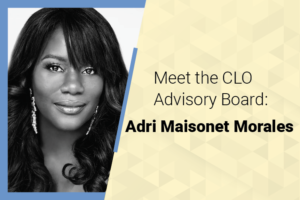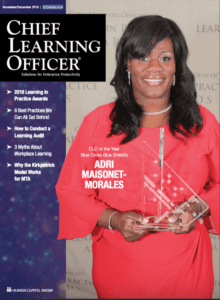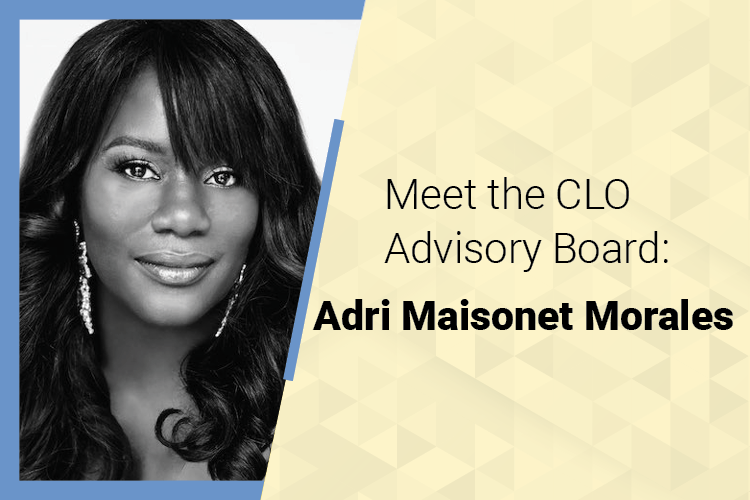 Chief Learning Officer recently sat down with Adri Maisonet Morales, vice president of Enterprise Learning and Blue University at Blue Cross Blue Shield of North Carolina. She has more than 29 years in the learning and talent development industries, and in 2016, she was awarded CLO of the Year.
Chief Learning Officer recently sat down with Adri Maisonet Morales, vice president of Enterprise Learning and Blue University at Blue Cross Blue Shield of North Carolina. She has more than 29 years in the learning and talent development industries, and in 2016, she was awarded CLO of the Year.
Chief Learning Officer: Where is your hometown?
You would think that this would be a straightforward question, but alas, it is not! For starters, I live in and work in the Triangle of North Carolina. Since I’ve lived in the Triangle since 1993 and my children are here, I consider it home. Although born in the U.S., I have deep family roots in Panama, which will also always be home. Finally, I was raised in a military household before my dad retired in Georgia. Since I still have family there, that too is home. So you see, not so straight forward in my case.
CLO: What was your first official job in learning and development?
My first official job in L&D was the director of the Blue University Project Office. At the time, we were undergoing a significant transformation as a company. It so happened that the learning department was struggling to adapt to the pace and skill requirements of this new work, so I was given a fantastic opportunity to reimagine the L&D function. It was an incredible experience. I didn’t have a learning background but had worked with them as a business leader, so I was familiar with their processes, strengths and challenges. The team was incredibly talented, but lacked business acumen. This is where I had an advantage, and was able to come in and immediately add value. Because I understood the business so well, I knew the new capabilities and skills that the learning function needed to acquire to thrive in the new environment. As I taught them, they taught me. It was great.
CLO: What lessons did you learn in 2020 that you’ve taken with you into 2021?
The first lesson was to be audacious. Historically, learning leaders tend to play it “safe,” and I was no exception. I’ve never been risk-averse, but I would often err on the side of caution with learning solutions. However, with the advent of COVID-19, many of us were faced with taking significant, bold risks to meet the new demands being imposed. Again, I was no exception. I had to get very comfortable taking out-of-the-box risks and becoming much more agile as I balanced the organization’s needs against the workforce’s learning capacity. The second lesson is inextricable from the first, and that was to get much more disciplined about data. While I have always had a healthy respect for learning analytics, taking bold risks must be informed by credible data.
CLO: I read that you hold a number of degrees and certifications, and overall truly embody the idea of being a lifelong learner — what will you be learning about in 2021?
There are a few things on my list. As mentioned, I am working to increase my knowledge of learning analytics in the context of driving business outcomes through the ROI Institute’s certification program. I am also spending a lot of time understanding innovations that are shaping the future of workplace learning. Finally, I am pursuing a doctoral degree in executive leadership in health care. I won’t know if I am accepted into the program until March, but I am hopeful.

CLO: How do you enjoy spending your time outside of work?
In my spare time, I enjoy a wide range of volunteerism. I am very active with organizations that focus on health disparities, solving food insecurities and promoting economic equality through education and development. One of the most fun things that I enjoy is hanging out with my giant poodle, Bentley! He is a Standard Poodle puppy that is already more than 50 pounds, and he keeps me hoping.
CLO: What book (audio or physical) or podcast has gotten you through this past year and the pandemic?
I am currently enjoying “Learning Analytics: Using Talent Data to Improve Business Outcomes.” As the need to drive business outcomes becomes even more imperative, this book, in my opinion, is a must-read, especially for those who may be starting their data journey. The other is the Brene Brown podcast series. I love her work and find her thoughts relevant to my personal and professional life. One of my favorite segments is about empathy, given the state of the world today.
CLO: In your opinion, what are some components of a robust L&D program?
I get asked this question a lot. In my opinion, big or small, robust learning organizations should be run like a business. To that point, the following are a few key components that I find essential:
- A clearly defined and executable strategy that optimizes effectiveness, efficiency and alignment.
- A healthy ecosystem that enables you to deliver on the value of learning.
- High data literacy and measurement maturity that informs decisions, investments, continuous improvement opportunities and the evidence-based stories of the impacts of learning.
- Top-down and bottom-up engagement.
- An efficient delivery system that cultivates a good learning experience at a cost-effective price point.
- Governance that ensures alignment with strategic priorities and the voice of the customer.
- Empowered talent that embraces change and innovation.
- Relationship capital. L&D must be seen as relevant business partners that are collaborative and credible assets.
- Connected to best practices, thought leaders, and other learning leaders.
- Learning is in the fabric of who they are, which generates the grit and resilience needed to stay ahead of the curve.
CLO: What advice do you have for CLOs and learning leaders as they take on 2021?
The biggest advice that I have for CLOs and learning leaders is to reignite your excitement for learning and develop a child-like curiosity for the possibilities that the future of learning has to offer. Unlike any other time in our recent past, have we seen such a reliance on learning organizations. Capitalize on the disruptions by evolving your learning organization into a fully realized asset using short and long-term smart goals.















